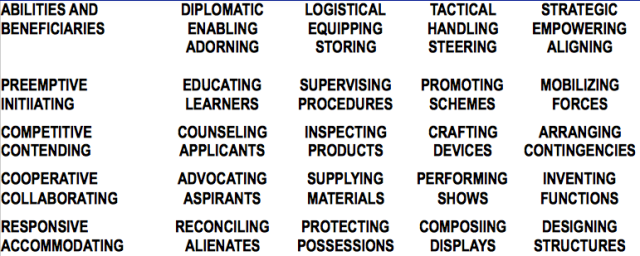The four kinds of ability are not equally distributed. Half of the population, fifty percent, are Guardians, born with logistical ability, Forty percent of the population are Artisans, born with tactical ability. That leaves a mere ten percent for the Idealists and Rationals, born with diplomatic ability in the case of Idealists, and strategic ability in the case of Rationals. Fortunately, the few Rationals can do all of the mobilizing, arranging, inventing, and designing needed. Unfortunately, the few Idealists are far too scarce to do all of the educating, counseling, advocating, and reconciling needed, education, especially, suffering from the shortage of Idealists.
Civilization would not prosper as it has these many centuries were it not for the preponderance of those born with logistical ability, the Guardians. Half the population, they see to it that procedures, products, materials, and possessions are safe and secure. The other beneficiaries, especially Artisans and Rationals, fending for themselves by pooling in places where they can best use their favored words and tools to advantage. Unfortunately, most Idealists, although birds of a feather, do not flock together, knowing only that they are different from all others. Those few, the brightest and most aggressive, do find themselves, and thrive in places that appreciate and reward them for their splendid abilities.
The factors above the frame are ways of implementing aims. For implementation of aims, tools are required, each kind of tool structured precisely for the function to be accomplished by the tool-user. The Idealist uses covers to adorn and enable, the Guardian containers to equip and store, the Artisan sticks to handle and steer, the Rational ropes to empower and align. The factors beside the frame are ways of communicating with others. For communication of messages words are required, each kind of word chosen for the meaning intended by the word-user. Learner education, procedure supervision, scheme promotion, and force mobilization are ways of preemptive initiation. In contrast to preemptive initiation, alienate reconciliation, possession protection, display composition, and structure designation are ways of responsive accommodation. In contrast to competitive contention, applicant counsel, product inspection, device craft, and contingency arrangement are ways of cooperative collaboration. The four ways of communicating ─ initiating, contending, collaborating, accommodating ─ facing the four ways of implementing ─ diplomacy, logistics, tactics, strategy, reveal sixteen kinds of productive ability, each unique, each valuable, each irreplaceable. None of us, no matter how gifted and practiced, can master more than a few of the sixteen kinds of competent action.




As a Composer (ISFP), I’m thankful that Personology‘s misleading formula “composing stories” has been replaced with “composing displays.” The word “story” implies a narrative, but our compositions are not always narratives.
Reblogged this on iheariseeilearn and commented:
‘Productive Ability’-David Keirsey
There does not seem to be enough Idealists, yet of the few I know, Asia and Asian region, Africa, Europe, America they are powerful catalysts.
Reblogged this on Please Understand Me and commented:
Professor Keirsey has outlined productive ability.
Interesting. Do any of these productive abilities have overlaps? Designing Structures and Inventing Functions being an example.
Yes, the abilities do overlap. Each individual is capable of all sixteen abilities in varying degrees. But as in your example, Designing Structures and Inventing Functions are “two sides of the same coin” — Engineers (Designing Structures and Inventing Functions) must exercise both, just not equally. So the “overlap” is Engineering, in this case. On the other hand, Designing Structures has very little to do with Supervising Procedures and visa versa. Designer Rationals are typically totally incompetent in supervising procedures (it bores them to hell) and Supervisor Guardians are not too swift at Designing Novel Structures. People do best what they do best, and given a half a chance they will practice what they are naturally good at.
Pingback: The Binding Counselor | Please Understand Me